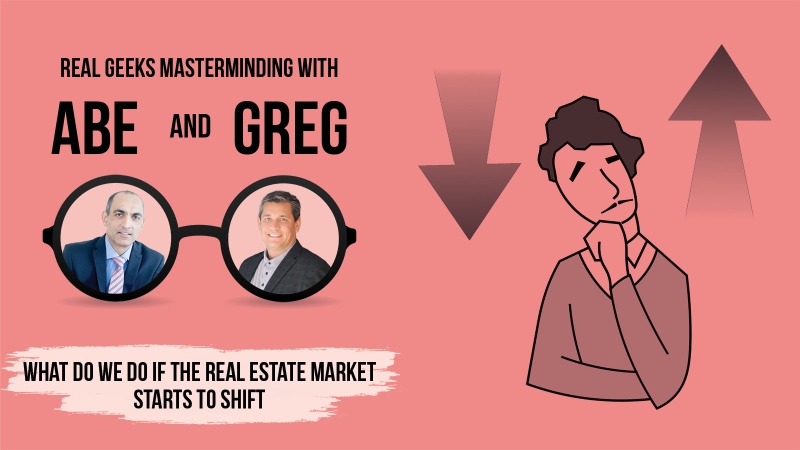What To Do If The Real Estate Market Starts To Shift?
What To Do If The Real Estate Market Starts To Shift?

A shift in the market may start to worry real estate agents. For one, it can affect their commission rates. Secondly, it can lead to their clients losing interest in a property.
In this episode, Abe and Greg examine what it really means when the market shifts. As a start, Abe defines “shift,” or correction, as a slight change of position, direction, or tendency. Hence, a shift shouldn’t be equated to a market “crash.” Both believe that a shift shouldn’t be a cause of concern in itself. In fact, a shift can even bring benefits to an agent.
Bringing Certainty to the Consumer
Setting Yourself Apart
Current State of the Real Estate Market
“The real estate market has been on fire for about two years now.” - Abe
Abe begins the discussion by distinguishing and defining appreciating and depreciating markets. The former refers to when a particular market rises in value. The latter, meanwhile, is when the market’s value falls.
When a market appreciates, the first market that’ll rise is single-family homes, as it’s more in demand. The second to rise will be condos on “golf courses” or those that are located in a hot area. Then, the final wave of appreciation will affect those that are less in demand or desirable. Even if they’re not in demand, these properties will still be pushed by the market.
In light of the current state of the real estate market, Abe reports that there has been a noticeable and significant appreciation on oceanfront condominiums since April 15. If this trend continues, then it’s a clear sign that a market shift is happening.
3 Things We Do If The Market Shifts:
What If There Is a Market Shift?
An agent’s reaction to market shifts will determine the outcome of their business. So, if ever there’s a market shift, real estate agents should focus on the following things.
Mindset Shift
A mindset shift begins by not panicking or worrying. In fact, some agents/corporations attribute their success to when the market is down. This means that there’s actually an opportunity for grabs when the market is down. Thus, a shift in the market doesn’t necessarily mean that your business will go down, too.
Greg highlights some effects of a changing market:
- You gain market share in a declining market
- You fight to maintain market share in an increasing market.
- The majority of agents lose market share in a hot market since there are a lot of licensees that get into the business.
Shift Conversations
“Approximately 6 million houses are sold every year.” - Abe
With knowledge and real data, you don’t have to worry about what the media presents. Having actual data is important since consumers, who are not experts in the field, need certainty. This means they need to rely on people like you who know the facts.
Greg presents two tips when talking to a client during market shifts.
- Future pacing: Assure clients that you’re constantly monitoring the market.
- Blame the market: Don’t tell them to change the price without data. In other words, act as an interpreter of the shift, then inform them that the price is suited for the current market shift.
Increase Activities
This involves tracking your numbers, like conversions and ratios. After getting the number, increase your amount of activity/lead generation by 25%. This way, your business can survive despite market shifts.
You can’t control the real estate market or the economy. Hence, don’t sit and whine about the market shifting. Instead, capitalize on what’s going to change and when it’ll change. By doing so, your real estate business will still grow.
- Published 2022/05/09
- |
- Share This Post (Permalink)
- |

Categories
- Tech (48)
- Blogging (1)
- New Sites (1)
- Events (5)
- IDX (30)
- Marketing (93)
- Web Design (14)
- SEO (15)
- Real Estate Lead Generation (117)
- Keeping It Real (12)
Archives
- May 2022
- Apr 2022
- Mar 2022
- Feb 2022
- Jan 2022
- Dec 2021
- Nov 2021
- Oct 2021
- Sep 2021
- Aug 2021
- Jul 2021
- Jun 2021
- May 2021
- Apr 2021
- Mar 2021
- Feb 2021
- Jan 2021
- Dec 2020
- Nov 2020
- Oct 2020
- Sep 2020
- Aug 2020
- Jul 2020
- Jun 2020
- May 2020
- Apr 2020
- Mar 2020
- Feb 2020
- Jan 2020
- Dec 2019
- Nov 2019
- Oct 2019
- Jun 2019
- May 2019
- Apr 2019
- Mar 2019
- Dec 2018
- Nov 2018
- Sep 2018
- Aug 2018
- Jun 2018
- May 2018
- Apr 2018
- Mar 2018
- Jan 2018
- Dec 2017
- Oct 2017
- Aug 2017
- Jul 2017
- Jun 2017
- May 2017
- Mar 2017
- Feb 2017
- Jan 2017
- Nov 2016
- Sep 2016
- Aug 2016
- Jun 2016
- May 2016
- Apr 2016
- Mar 2016
- Feb 2016
- Jan 2016
- Nov 2015
- Oct 2015
- Sep 2015
- Aug 2015
- Jul 2015
- Jun 2015
- May 2015
- Apr 2015
- Mar 2015
- Feb 2015
- Dec 2014
- Nov 2014
- Oct 2014
- Sep 2014
- Aug 2014
- Jul 2014
- Jun 2014
- Nov 2013
- Aug 2013
- May 2013
- Jan 2013
- Dec 2012
- Nov 2012
- Aug 2012
- Apr 2012
- Feb 2012
- Sep 2011